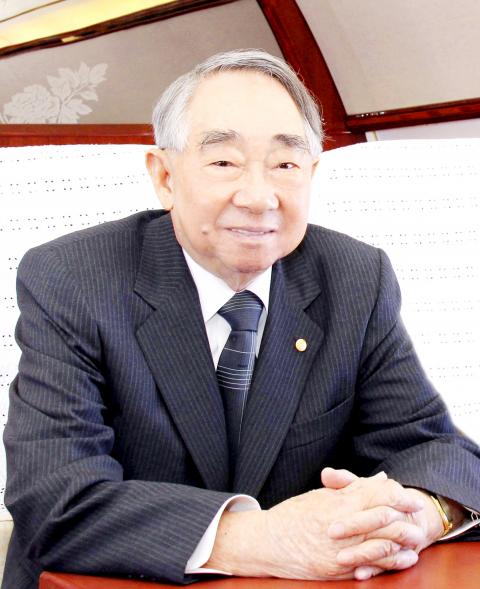Chang Yung-fa (張榮發), the billionaire founder of Evergreen Group (長榮集團) who turned a second-hand bulk carrier into Asia’s biggest container-shipping line, died yesterday. He was 88.
He died at 11:05am, Evergreen Group said in an e-mail. No cause was given.
Chang, the son of a seaman, started building his business almost five decades ago by buying a used bulk vessel and became one of the nation’s richest people. He was chairman of Taipei-based Evergreen Group, which owns Asia’s largest container fleet through Evergreen Marine Corp (長榮海運); EVA Airways Corp (長榮航空), the nation’s largest airline by market value; Evergreen Sky Catering Corp (長榮空廚), an airline-catering company; and hotel chain Evergreen International Hotels (長榮桂冠酒店).

Photo: EPA
Chang has a fortune of at least US$1 billion, according to the Bloomberg Billionaires Index.
“The oceans and ships occupy very important places in my life,” Chang wrote in his autobiography, published in 1997.
The tycoon called himself “a natural-born son of the ocean.”
Evergreen Marine, the company that began his business empire, was established in 1968 with the used bulk vessel.
It expanded into an operator of more than 190 ships, according to information from shipping-data provider Alphaliner.
The company posted a net loss of NT$2.41 billion (US$71.25 million at current exchange rates) in the quarter ended September last year, after posting a profit a year earlier, as the global economic slowdown hurt the shipping industry.
Chang was also an advocate of closer economic relations with and China. In 2008, Taiwanese and Chinese airlines, including EVA Airways, began regular flights across the Taiwan Strait after the lifting of a six-decade ban on direct transport links.
His personal holdings as of Dec. 31 last year included 6 percent of publicly traded Evergreen Marine and 2.9 percent of EVA Airways, the nation’s largest airline by market value, according to data compiled by Bloomberg.
His youngest son, Chang Kuo-wei (張國煒), is chairman of EVA Airways.
Evergreen Group is the benefactor of non-profit organizations such as a maritime museum and a symphony orchestra.
Born on Oct. 6, 1927, in the northeastern coastal township of Suao (蘇澳), Chang was the third of seven children. He started working as a clerk for a Japanese shipping company as a teenager while attending night school and went on to spend 15 years as a sailor, rising to the rank of captain.
Chang became the family’s breadwinner when his father died in 1944, as his two elder brothers had married by then, according to his book.
He was married in 1953, and had four sons and a daughter.
In 1989, his son Chang Kuo-ming (張國明) was kidnapped for a US$1.9 million ransom.
The younger Chang was eventually released unharmed, while his three kidnappers were apprehended and executed the following year, The Associated Press reported at the time.

The CIA has a message for Chinese government officials worried about their place in Chinese President Xi Jinping’s (習近平) government: Come work with us. The agency released two Mandarin-language videos on social media on Thursday inviting disgruntled officials to contact the CIA. The recruitment videos posted on YouTube and X racked up more than 5 million views combined in their first day. The outreach comes as CIA Director John Ratcliffe has vowed to boost the agency’s use of intelligence from human sources and its focus on China, which has recently targeted US officials with its own espionage operations. The videos are “aimed at

STEADFAST FRIEND: The bills encourage increased Taiwan-US engagement and address China’s distortion of UN Resolution 2758 to isolate Taiwan internationally The Presidential Office yesterday thanked the US House of Representatives for unanimously passing two Taiwan-related bills highlighting its solid support for Taiwan’s democracy and global participation, and for deepening bilateral relations. One of the bills, the Taiwan Assurance Implementation Act, requires the US Department of State to periodically review its guidelines for engagement with Taiwan, and report to the US Congress on the guidelines and plans to lift self-imposed limitations on US-Taiwan engagement. The other bill is the Taiwan International Solidarity Act, which clarifies that UN Resolution 2758 does not address the issue of the representation of Taiwan or its people in

US Indo-Pacific Commander Admiral Samuel Paparo on Friday expressed concern over the rate at which China is diversifying its military exercises, the Financial Times (FT) reported on Saturday. “The rates of change on the depth and breadth of their exercises is the one non-linear effect that I’ve seen in the last year that wakes me up at night or keeps me up at night,” Paparo was quoted by FT as saying while attending the annual Sedona Forum at the McCain Institute in Arizona. Paparo also expressed concern over the speed with which China was expanding its military. While the US

SHIFT: Taiwan’s better-than-expected first-quarter GDP and signs of weakness in the US have driven global capital back to emerging markets, the central bank head said The central bank yesterday blamed market speculation for the steep rise in the local currency, and urged exporters and financial institutions to stay calm and stop panic sell-offs to avoid hurting their own profitability. The nation’s top monetary policymaker said that it would step in, if necessary, to maintain order and stability in the foreign exchange market. The remarks came as the NT dollar yesterday closed up NT$0.919 to NT$30.145 against the US dollar in Taipei trading, after rising as high as NT$29.59 in intraday trading. The local currency has surged 5.85 percent against the greenback over the past two sessions, central